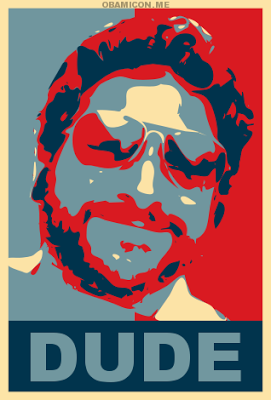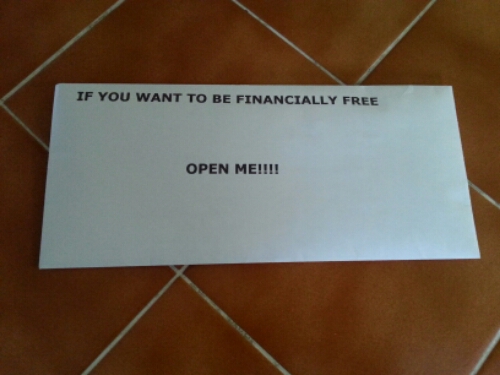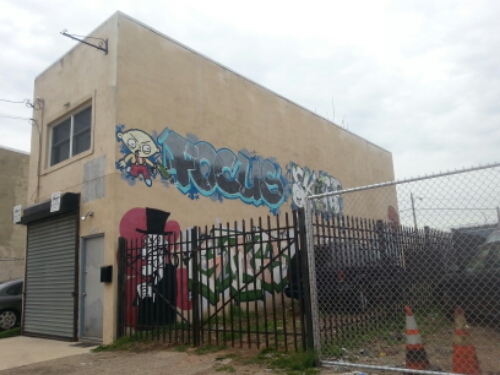This showed up in today’s “mail.”
Haven’t opened it yet.
What do you think is in there?
Category Archives: Philly Living
Trolley Stop
Crazy People On SEPTA
Why was I late to work today?
 Because of crazy people on SEPTA!
Because of crazy people on SEPTA!
I ride the 15 Trolley about 4 days a week. They are beautiful vehicles! The original design for these trolleys was from the 1930s, and the guts are totally remade for the modern era. It’s often the favorite part of my commute. Unfortunately, the trolley connects rough neighborhoods with rougher ones. There are people on the nod, on the way to or from the Methadone Clinic or, like me, on their way to and from work. This morning I was witness to some real craziness, and after the trolley stood motionless for a good 5 minutes, I decided to record what was going on.
So I now present to you:
Crazy People on SEPTA (The Video)
Jury Dude
 I’ve been called for jury duty. Not only that, I’ve been chosen to actually serve on a jury. (Pause for reaction. Don’t worry, I’ll ask you about it later.) Here it is, the week of Rosh Ha’shanah, I’m still getting over the summer, have a group of new Birthright Israel NEXT Fellows to break in, and now, I have jury duty. I’m actually quite happy I was picked for a jury, particularly right around now. The High Holiday service is filled with courtroom references, and so it’s a great place to be at this time of year.
I’ve been called for jury duty. Not only that, I’ve been chosen to actually serve on a jury. (Pause for reaction. Don’t worry, I’ll ask you about it later.) Here it is, the week of Rosh Ha’shanah, I’m still getting over the summer, have a group of new Birthright Israel NEXT Fellows to break in, and now, I have jury duty. I’m actually quite happy I was picked for a jury, particularly right around now. The High Holiday service is filled with courtroom references, and so it’s a great place to be at this time of year.
When I mentioned that I had jury duty, what was your reaction? Did you roll your eyes? A lot of people do. The reactions that I’ve gotten have ranged from “Oh man,” to “that sucks, dude.” The most common question that I’ve been asked is, “couldn’t you get out of it?” And this concerns me. It also seems to me that people have no idea what jury duty entails. Most people that I speak to equate jury duty with siting in the jury selection room all day and trying to avoid being assigned a case. The day is considered long, boring, a waste of time and above all, a terrible inconvenience. I think people would feel differently if they actually served on a jury.
Trial by jury is guaranteed by the sixth amendment to the US Constitution, sometimes referred to as The Bill of Rights. It reads as follows:
“In all criminal prosecutions, the accused shall enjoy the right to a speedy and public trial, by an impartial jury of the State and district where in the crime shall have been committed, which district shall have been previously ascertained by law, and to be informed of the nature and cause of the accusation; to be confronted with the witnesses against him; to have compulsory process for obtaining witnesses in his favor, and to have the Assistance of Counsel for his defence.”
The sixth amendment also promises a speedy public trial, referring to the length of time one has to wait until their case is heard.
When our jury was selected, the court clerk commended us for being electing to serve. That day, the court needed juries for 11 major felony trials including 7 murders. Approximately 300 people need to be interviewed to find 14 people to sit on one of these cases. But due to the fiscal crisis here in Philadelphia, the court can only call in about 400 people per day. (This same fiscal crisis has let to the closing of recreation centers, layoffs for police and firemen and on October 4, 2009 the Philadelphia Public Library system will be entirely shut down.) Because people find reasons to excuse themselves, defendants are stuck in jail awaiting their trial. This sparsity of jurors in Philadelphia is of particular concern to me. I ride my bicycle past the National Park with Independence Hall on one side and the National Constitution Center on the other. This is literally the place where the American idea of a jury was conceived, written and signed into the Bill of Rights in 1791. While biking up Market Street to City Hall for court, I glance up at the ancient clock tower to make sure I’m on time. It’s like a participatory field trip to learn about the legal system and its history.
During the jury selection process, you are asked a number of questions to determine your fitness to be a juror. Before that, you are asked to swear or affirm that you’re telling the truth. The word “affirm” is there for people whose religion prohibits them from swearing. (Ask your local rabbi about “swearing vs. affirming” before Kol Nidre.) If we expect those around us to tell the truth then shouldn’t we tell the truth during jury selection, as well? Why does it seem that people don’t mind lying in that context? If you are selected for a panel of eligible jurors, you then proceed to voir dire, where you are asked further questions about your possible biases which may influence your impartiality. The term voir dire has roots in both Latin and Old French, and refers to telling the truth.
I work in the field of Jewish Communal Service. Most of the people I interact with are in the same business. They work in organizations that promote Jewish Learning and Values. Among those values, Social Justice is high on the list. I’ve seen a lot of Social Justice programming over the past few years. “Justice, justice you shall pursue,” the famous quote from Deuteronomy is often featured in a text study where participants reflect on how their day of feeding the homeless is the embodiment of Jewish ethics and values. But when it comes to jury duty, where a person is can play an important role in the application of justice, my peers, colleagues and neighbors all decide to opt out.
When I press people about their negative reaction to jury duty, they point out the inconvenience factor. “It takes you away from your life for a day, or a week or *gasp* a week and a half.” There is never going to be a convenient time to serve on a jury, but occasionally you are asked to fulfill your civic duty. As a dual citizen of Israel and the United States, I have a unique perspective on this. In Israel, “civic duty” means serving in the army for two or three years. After release from the IDF, Israelis must do reserve duty, or miluim, until they age out at around 40. Miluim usually takes people away from their lives for anywhere from 2 weeks to a month at a time. It’s never a convenient time, and some people try to get out of it, but for the most part, people just sigh and go. And then I look around here in America, and see people who don’t want to exercise the privilege of serving on jury.
One of my fellow jurors said that her mother feared she would be killed for sitting in a jury. This is the irrational fear that a murder defendant, or the defendant’s friends and family will track down the jurors, and kill them, one by one. The mother calmed down when she heard that the case was civil and not criminal. But still: The immediate reaction to jury duty was fear of death! Another of my fellow jurors voiced some concern about her employer. The court clerk assured the juror that there’s nothing to worry about. You can’t lose your job for jury duty, it’s illegal. The clerk then told a story about an incident where an employer insisted that his employee report to work instead of court. The judge had the sheriff bring the employer to the courtroom where he was forced to watch the whole two week trial with the sheriff looking over his shoulder. And then I think about employers in the field of Jewish Communal work. I can’t imagine any of them would prevent an employee from serving on a jury. I mean, what’s the worst thing that could happen? Will Judaism cease to be because “Yankel” had jury duty? I think not. And by the way, I’m managing the workload just fine. With my blackberry at my hip, I can keep up with work via email, text message, phone call, facebook and twitter.
Each of you has the right to a trial by a jury of your peers. My peers are all very smart people. Smart enough to figure out a way to avoid jury duty. But those are precisely the people who should serve on juries; people who can listen to evidence and judge facts intelligently. At a Jewish event, I met another person who served on a jury recently. He told me about his case, where he was an alternate and thus excluded from the final deliberation. He was relieved to be excluded, because the jury’s verdict of life in prison didn’t sound like the right decision to him.
With the High Holidays coming up fast, a lot of my peers are spending this time to think about what they’ve done over the past year, and what they’ll be doing to improve in the future. It’s almost like we’re putting ourselves on trial, acting as our own jurors. Rosh Ha’shanah and Yom Kippur don’t necessarily have to be about marathon sessions at synagoge, or fasting for a day. Instead, what if they were just a way of showing up for jury duty? You already know the facts of your own case, and now you get the chance to do something about it. The letter’s already in the mail, it’s our turn to sit in the box. We’re all being called for jury duty, and instead of rolling our eyes or getting out of it, let’s take advantage of this opportunity to hear the evidence, and decide for ourselves how we’d like the court to rule.
(Pause for reaction.)


